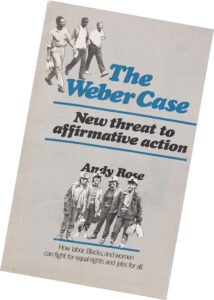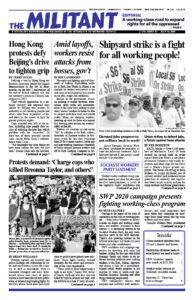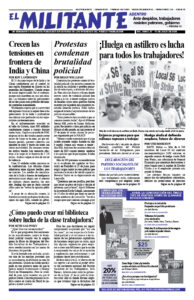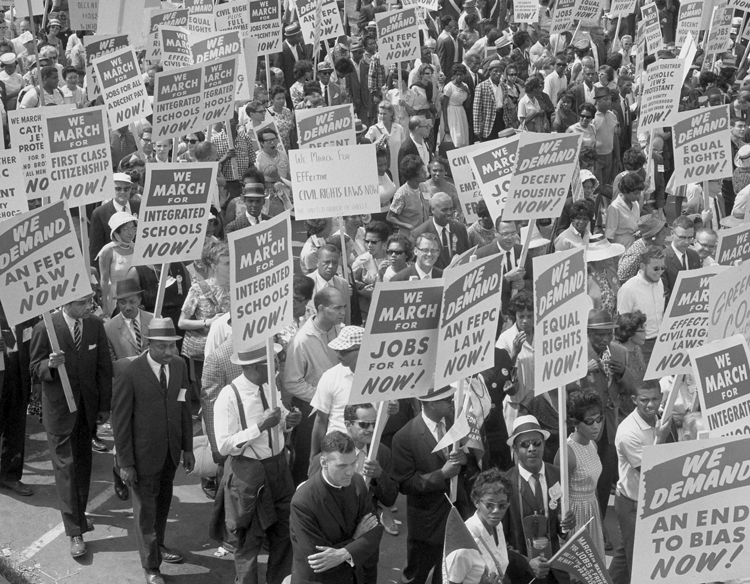An article in last week’s issue of the Militant — under the headline “Supreme Court: Job Discrimination for Being Gay, Transgender Is Illegal. Ruling Includes ‘Poison Pill’ Against Women’s Rights Fight” — was wrong. It erroneously implied that the June 15 court decision, though flawed, should be welcomed by the working class and others fighting to eradicate prejudice, bigotry and discrimination in employment and other areas.
The stakes for the working class and our allies in opposing each of the three separate firings at issue in the court case are indisputable. The bosses themselves readily acknowledged they had fired the workers only upon learning they were gay or transsexual, without the pretense of any work-related reason. If employers get away with arbitrarily singling out a worker for firing or other penalties, then any fighting capacity of the workforce and unions for unity in protecting one another is set back, irreparably so if not combated and reversed.
Building such class solidarity is the central task of all class-conscious workers today. It starts with fights on the job over wages and working conditions, including the health and safety of all. This is how we begin rebuilding a fighting labor movement, a fighting trade union movement.
Advancing rights of all workers
The recent Supreme Court decision, however, has nothing to do with strengthening class consciousness or class solidarity.
To the contrary, the ruling laid the basis for further eroding hard-fought gains conquered by the working class and our allies — including those won over centuries of struggle for women’s equality — by consciously muddying the fundamental difference between an individual’s biological sex and matters of “gender identity” or “sexual orientation.”
What’s worse, it deceptively called on the authority of the Civil Rights Act of 1964 while making a travesty of that law’s Title VII, which outlaws job discrimination on the basis of “race, color, religion, sex or national origin.”
For anyone who lived through that period of American history marked by the proletarian-based civil rights battles of the 1950s and 1960s, much less participated in them, the significance for the entire working class of its conquests in toppling Jim Crow segregation and tearing down employment barriers for workers who are Black, female or foreign-born are beyond dispute.
Rights that truly register progress for working people expand and strengthen the rights of all the oppressed, as well as their political space for fighting. That has been true for every advance in combating the denial of rights under capitalism based on “race, color, religion, sex or national origin.”
In the 1970s, for instance, as women fought their way into industrial jobs from which they had traditionally been barred, they often demanded and won contract terms guaranteeing that the difficulty or danger of particular tasks was not grounds to deny women employment. To the contrary, they insisted, work rules should be adjusted to protect all workers from such harmful job conditions. The unions and many co-workers who were male were won to these fights, which led to victories for the entire working class and labor movement.

Another example was the union contract fought for and won in 1974 by members of the United Steelworkers union at the Kaiser Aluminum plant in Gramercy, Louisiana. Some 40% of workers there were Black, but prior to the new agreement fewer than 2% of better paying “skilled jobs” had been held by workers who were Black, and none by women. Most workers at the Gramercy plant — Caucasian as well as Black, both male and female — were convinced at that time that all workers in the plant would benefit from a job-training program that reserved half the spots for Blacks and women, thus strengthening the unity and fighting capacity of the workforce and their union.
When lab technician Brian Weber, who was Caucasian, filed suit against the union, claiming “reverse discrimination,” the fight to defend the new trainee program was championed not only by the USW but more broadly in the labor movement and beyond. In June 1979 the U.S. Supreme Court rejected Weber’s challenge — a victory for working people.
That is the kind of working-class action needed to defeat arbitrary and discriminatory hiring, firing or promotion practices of any kind by private or government employers. Changing attitudes about countless forms of discrimination and bigotry are not the product of either legislation or court rulings but of unity forged in struggle by working people, the oppressed, and our class organizations.
That’s what we can celebrate. Such actions, and others like them to come, point the way forward.
Working class: defender of science
The court’s contorted ruling as to what constitutes discrimination based on “race, color, religion, sex or national origin” is a blow to working people and the oppressed. It lends credence to the utterly anti-scientific notion promoted by many who consider themselves enlightened, progressive, that human beings (unlike almost all other animal species) are not born as either female or male.
According to proponents of this anti-materialist outlook, whether a baby bears two x chromosomes or an x and y chromosome, they don’t come into the world with a pre-established sex, but are instead arbitrarily “assigned” one based on physical appearance at time of birth.
Those holding this unscientific view demand that “gender” — solely a grammatical term until only several decades ago — instead be left open at birth, to be “chosen” by the individual sometime later in life from literally dozens of possible options. Anyone can supposedly be a woman or a man, or virtually any variant in between, merely by declaring themselves so.
“The only difference between a trans woman and a cisgender woman”— that is, a woman — “is the sex assigned to her at birth,” according to a June 23 op-ed column in the New York Times by Devin Michelle Bunten, an assistant professor of urban economics at M.I.T. (Perhaps a professor of “rural economics” might be more acquainted with sexual reproduction among mammals than this PhD-certified “teacher”!)
What is seen by some as a revolutionary advance in the understanding of “gender” is in fact a counterrevolution. The oppression of women as a sex throughout millennia of class-divided society is simply erased. The gains for women’s emancipation won through centuries of struggle by the working class, often led by women, since the consolidation of industrial capitalism in the 1800s — all this disappears with the wave of the same magic wand that allegedly turns a man into a woman, or vice versa.
Silencing speech, climate of fear
Millions of working people and others in the U.S. and elsewhere oppose employment or housing discrimination, indignities, or bullying and violence against any person who has chosen to live as a sex different from that of their biology. That’s a fundamental principle of human solidarity, of which the working class and workers’ movement are intransigent champions and defenders.
But many advocates of the anti-materialist, anti-working-class views described above aren’t really interested in countering discrimination and bigotry. They demand agreement with their views. They seek to deny freedom of speech as well as the right to employment to anyone who disagrees with them, even resorting to thuggish intimidation and physical threats.
One recent target of such abuse is J.K. Rowling, author of the Harry Potter books. Her “crime” is publicly defending Maya Forstater, a woman in the U.K. fired for stating the fact that a person’s sex is determined by biology. Forstater’s appeal of her dismissal was rejected in court. Rowling wrote in a June 10 article that she is concerned about the “climate of fear” stirred up by those “assuming a right to police my speech” and “call me misogynistic slurs.”
Contrary to claims by many liberals and radicals, there is no broad rise today of racist, anti-immigrant, woman-hating, or anti-gay and anti-transsexual prejudice among working people. The opposite is true. Never has large-scale intolerance been pushed back farther than it has today.
But there is still a good distance to travel, and the court decision attempting to short circuit the political fight to win broader support on these social issues will cut across this process.
These shifts in attitudes are the product of decades of struggles by working people and our allies. Powerful working-class battles in the 1930s built the industrial unions and began organizing all workers in a particular plant and industry. The Black struggle of the 1950s and 1960s gave renewed impetus to the fight for women’s emancipation. And battles by Blacks and women and their supporters inspired the movement for the rights of gays and lesbians. Not only had homosexuals been subject to reactionary laws pressing them into secret lives and “banning” their sexual activity, but also to persecution in jobs, housing, marriage and threats to their physical security.
From fights over workers’ wages and conditions on the job, to independent working-class political action and organization around social and political questions in our class interests, there is no other way forward for workers and the oppressed. It is by advancing along this working-class line of march toward political power that the toilers and our allies can win concessions and open the road to ending every form of exploitation, degradation, and bigotry inherent to capitalism, as well as those inherited from millennia of class-divided society.


